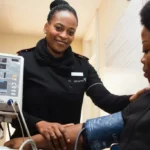Syphilis is a sexually transmitted disease caused by a bacteria called Treponema Pallidum. Every year, about 3.5 million cases of the infection are recorded across Africa. More men than women are affected by syphilis.
If caught early, it can be treated with antibiotics. It does not go away with time. This means without treatment, syphilis can get much worse than sores and ulcers around the genitals.
What are the signs and symptoms of syphilis?
The infection mimics symptoms of other diseases, making it difficult to detect in the initial stages.
There are four stages (primary, secondary, latent, and tertiary) through which the bacteria develops and the infection progresses. The symptoms that it presents with is dependent on which stage it is in.
Primary stage
The first stage of syphilis occurs about three to four weeks after a person contracts the bacteria. The first sign is a small round firm painless sore called a chancre. Typically, a chancre appears where the bacteria enters the body such as inside the mouth, genitals, or rectum.This phase is a highly infectious one, as physical contact with a sore is enough to contract it.
Secondary stage
The features of the second stage are sore throat and skin rashes that do not itch. Although the rash may appear on any part of the body, it affects the palms and soles more commonly.
Secondary syphilis is also characterized by headaches, fatigue, weight loss, fever, swollen lymph nodes, and joint aches. These symptoms are not peculiar to syphilis alone and they resolve with time, with or without treatment. However, the bacteria doesn\’t die.
Latent stage
This is a silent phase in which no obvious symptoms show up, leading the host to believe the condition is gone permanently. It could last up to as long as 10-20 years. Meanwhile, the bacteria is adapting and evolving into the final stage.
Tertiary stage
Most people who do not seek proper treatment will reach this stage. Tertiary syphilis can be life-threatening and occurs years after the first infection. It\’s occurrence is quite rare.
How is syphilis transmitted?
The infection is transmitted from one person to another via skin-to-skin contact with the chancre. Being an STI, the primary mode of syphilis transmission is sexual contact. This could be in the form of oral, anal, and vaginal sex.
Unknowing pregnant women can also give the infection to their child. This would result in the child suffering from congenital syphilis which presents with severe anaemia, meningitis, blindness and deafness, enlarged liver and spleen amongst others.
Lastly, syphilis can be gotten through sharing of needles and blood transfusion. Syphilis cannot be contracted from swimming pools, toilet seats, clothing, or cutlery.
How can syphilis be diagnosed?
If you have an active sex life, it is important to periodically carry out STI check ups. This is not only for your good but also the health of your sexual partner(s).
One of the screening tests for syphilis is VDRL (Venereal Disease Research Laboratory) test. It measures antibodies which are proteins produced by the body to fight off the syphilis infection. These antibodies are found in the blood hence, VDRL test is a blood test.
RPR (Rapid Plasma Reagin) is another screening test for syphilis. It measures nonspecific antibodies present in the blood of people who have the disease.
Another test used to confirm syphilis is the Enzyme Immunoassay (EIA) test. It is also a blood test that checks for syphilis antibodies.
Treponemal tests (TPPA, FTA-ABS) are the most accurate tests with their ability to detect latent syphilis.
Pregnant women should ensure they are tested for syphilis. Whether or not symptoms are observed, it is better to check it out and be safe to avoid transmitting the infection to her baby.
How to prevent syphilis
The infection can be avoided by practicing safe sex. The use of condoms or staying faithful to one partner is highly encouraged.
Pregnant mothers should endeavour to do a full STI test, including syphilis, for the sake of their well-being and that of the unborn child.
Sharp objects should not be shared and blood should be adequately screened before transfusion.
How to treat syphilis
Antibiotics are useful in treating syphilis and neurosyphilis. The regimen may be administered orally or intravenously for 10-14 days. You may be required to stay in the hospital during the course of your treatment, depending on the severity of your condition.
There is a misconception that once a person has had syphilis in the past, they are immune to it forever. This is untrue and misleading. Even if you have treated the infection previously, you can contract it again if you are exposed to it.
Before you can commence treatment, you should have been diagnosed by a professional. Consult a doctor so that the necessary tests will be carried out. Do not self-diagnose then begin to abuse antibiotics.
You can book STD tests and Healthtracka will bring the lab to you.




